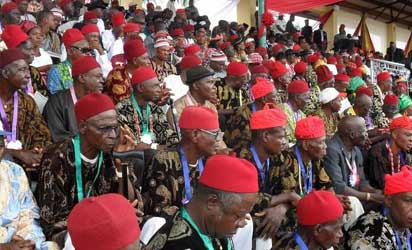The Igbo apprenticeship system, commonly known as Igba Boy, is a unique, community-based model of economic empowerment that has transformed the socio-economic landscape of the Igbo people in Nigeria. It is arguably the largest business incubator system in the world, serving as a mechanism that has lifted countless families out of poverty and enabled the Igbos to build generational wealth. Despite being a target of ridicule by other tribes who may not fully understand it, this system has proven to be one of the most effective models for creating economic success and fostering sustainable growth.
How the Igbo Apprenticeship System Works
At the core of the Igba Boy system is a form of mentorship where a young apprentice (usually a boy) is placed under the tutelage of a more experienced businessman. Over the course of several years—typically between five and seven—the apprentice learns the intricacies of running a business, including managing finances, dealing with customers, sourcing goods, and developing negotiation skills. The mentor, often a successful trader or entrepreneur, invests in the apprentice’s development, not only teaching the technical aspects of the trade but also imparting values of trust, hard work, and accountability.
At the end of the apprenticeship, a crucial event known as “settling” occurs. Here, the mentor “settles” the apprentice with seed capital to start his own business. This capital could be in the form of cash, goods, or a combination of both. The apprentice, now equipped with experience, knowledge, and financial backing, ventures out to establish his own enterprise, effectively becoming an independent businessman.
A Pillar of Igbo Economic Growth
The Igba Boy system has played a pivotal role in positioning the Igbo people as one of the most economically developed and industrious tribes in Nigeria. While other ethnic groups have traditionally relied on formal education and government jobs as the primary means of income generation, the Igbos have embraced entrepreneurship and trading on a massive scale. This can be attributed in large part to the widespread practice of the apprenticeship system, which has allowed even those from humble backgrounds to build wealth.
The success of this model is evident in the presence of Igbo traders and entrepreneurs in almost every corner of Nigeria and, indeed, across the globe. From major markets in Lagos to cities like Johannesburg, Guangzhou, and New York, Igbo traders have become a global commercial force. Their presence is a testament to the effectiveness of this system in building self-reliant individuals who are not only capable of sustaining themselves but also providing for entire communities.
Why Other Tribes Mock the System
Despite its undeniable success, the Igba Boy system has often been the subject of mockery by other ethnic groups in Nigeria. This mockery stems from a lack of understanding and perhaps envy of the success the system brings. The idea of young boys engaging in years of seemingly menial labor, working under strict discipline, is often perceived as backward or exploitative by those unfamiliar with the system’s inner workings.
However, these criticisms fail to grasp the long-term vision of Igba Boy. Unlike many other forms of employment that leave individuals stuck in wage labor with little hope for financial independence, this system offers a clear path to business ownership and wealth creation. While others may see it as an outdated practice, the apprenticeship model has continued to evolve, producing some of the wealthiest and most successful business leaders in Nigeria today.
Lifting Families Out of Poverty
One of the most remarkable aspects of the Igbo apprenticeship system is its ability to lift entire families out of poverty. In many cases, an individual who undergoes the Igba Boy system not only transforms his own life but also supports the education, healthcare, and overall welfare of his extended family. This ripple effect creates a network of prosperity that can sustain generations.
For many Igbos, formal education may not have been an option due to financial constraints. However, through Igba Boy, they are able to gain skills and capital that rival, if not exceed, the opportunities offered by formal education. It provides a practical solution to unemployment, particularly for young men from disadvantaged backgrounds who would otherwise face limited prospects in a challenging economy.
A Model for Wealth Creation
The Igbo Apprenticeship System that is embedded in the culture of Ndi Igbo has positioned the Igbos to build wealth in ways that other tribes and communities have not been able to replicate. It emphasizes the importance of skill acquisition, mentorship, and community support, all of which are essential ingredients for long-term success in business.
Unlike Western models of venture capital, where investors put money into start-ups in exchange for equity, the Igba Boy system operates on trust, loyalty, and mutual benefit. There are no contracts or legal formalities—just a strong bond between mentor and apprentice, often rooted in family or community ties. This trust-based system has proven to be more resilient and adaptable in the context of Nigeria’s informal economy.
As more businesses are established through this system, wealth accumulates not just at the individual level but within entire communities. This localized wealth creation helps to reduce the dependence on external sources of income and creates a self-sustaining economy. In many parts of southeastern Nigeria, entire towns have been transformed into bustling commercial hubs due to the success of traders who passed through the Igba Boy system.
Why the Igbo Apprenticeship System Should Be Studied and Encouraged
The Igbo apprenticeship system offers valuable lessons not only for Nigeria but for developing economies worldwide. It demonstrates the power of informal economic structures in driving wealth creation and social mobility. Several scholars and economic experts have highlighted the system as an ideal case study for how indigenous entrepreneurship models can thrive without reliance on external aid or government intervention.
- Promoting Financial Independence: The system equips individuals with the knowledge and resources to start their own businesses, reducing reliance on formal employment and government support.
- Community-Based Support: The apprenticeship model fosters a sense of communal responsibility, as successful businessmen often return to their villages to mentor others. This cycle of giving back ensures that wealth circulates within the community.
- Reducing Poverty and Unemployment: By offering young people a clear path to entrepreneurship, the system helps reduce youth unemployment and alleviates poverty at the grassroots level.
- A Scalable Model: While the system is rooted in Igbo tradition, its principles can be adapted to other contexts and communities. Countries or regions looking for sustainable ways to promote entrepreneurship and economic growth can learn from the Igba Boy system’s emphasis on mentorship, trust, and community collaboration.
Conclusion
The Igbo apprenticeship system is much more than an outdated practice; it is a thriving, informal venture capitalist network that has shaped the socio-economic destiny of the Igbo people. By creating a structured path for wealth generation, it has enabled the Igbos to rise above poverty, building businesses that span across Nigeria and the world.
While it may be misunderstood or mocked by those unfamiliar with its impact, Igba Boy stands as a testament to the power of indigenous entrepreneurship. It is a model that should not only be studied but also encouraged and adapted by other communities seeking to empower their youth and build lasting wealth.
The Igbos have demonstrated that with the right support system, financial independence and community-driven development are not only possible but sustainable over the long term. The world should take notice.
Follow us on Facebook and Instagram for the latest updates and exclusive content!




